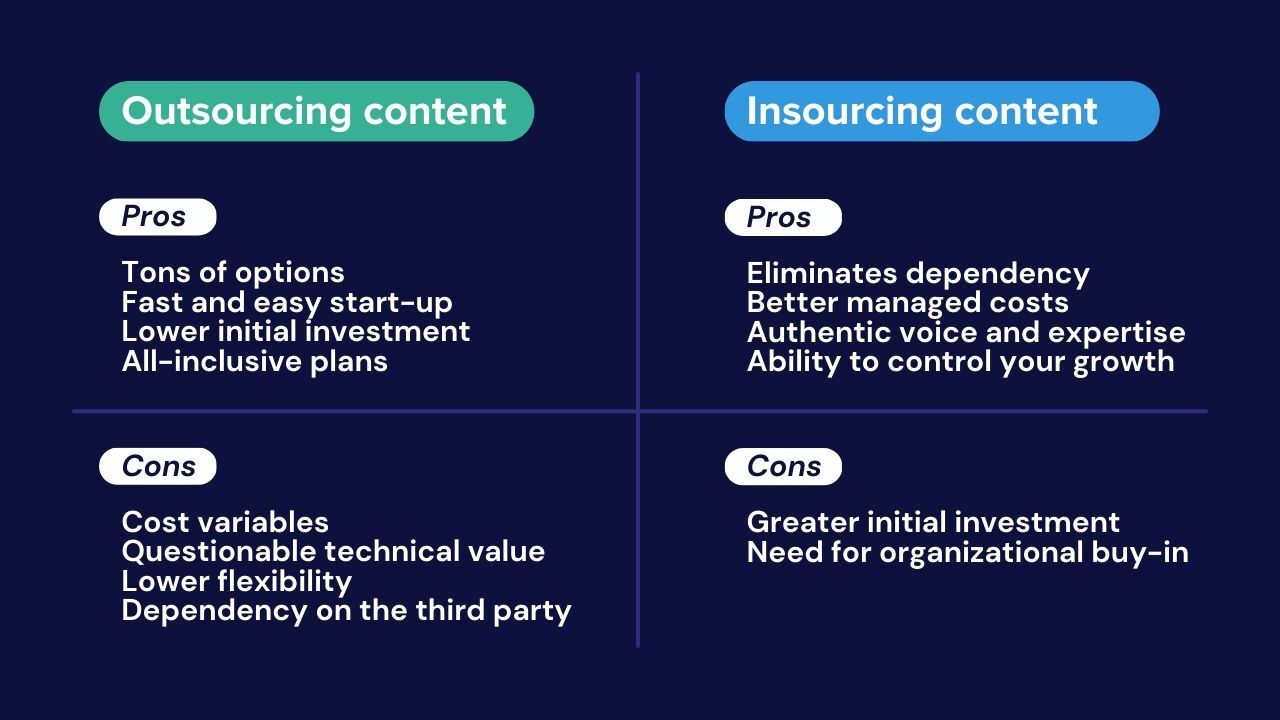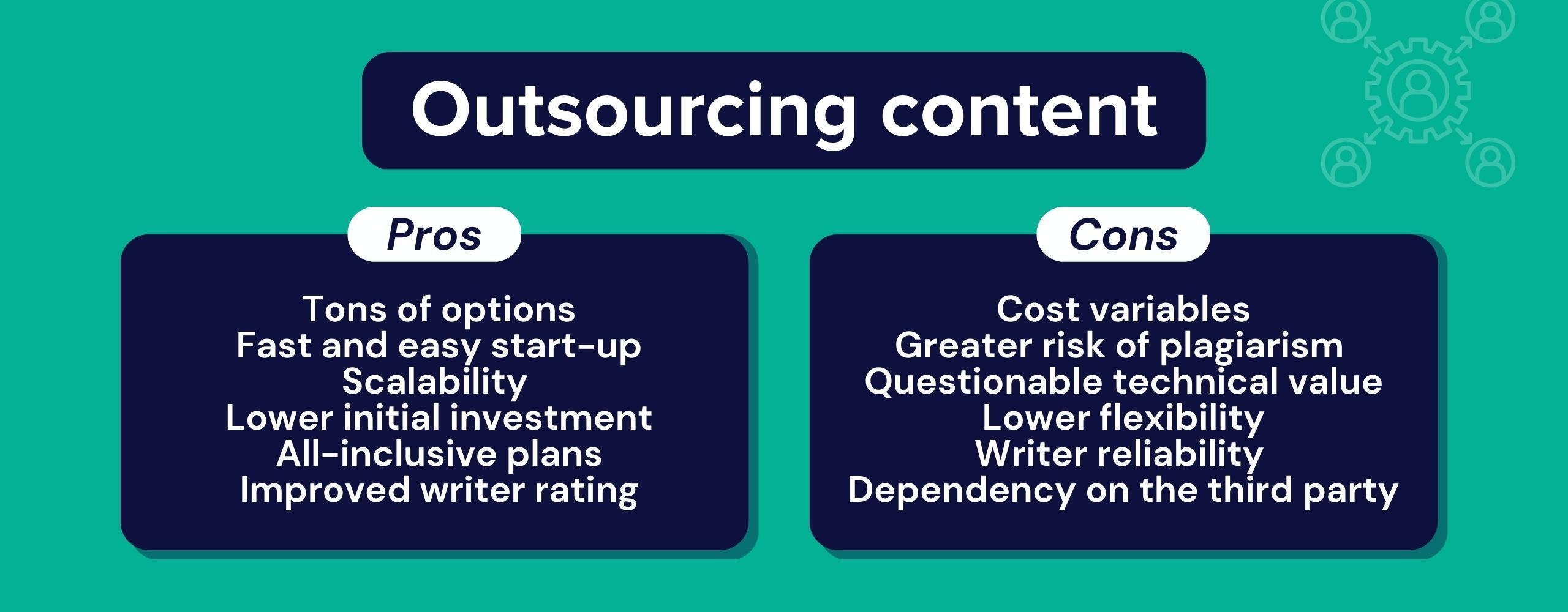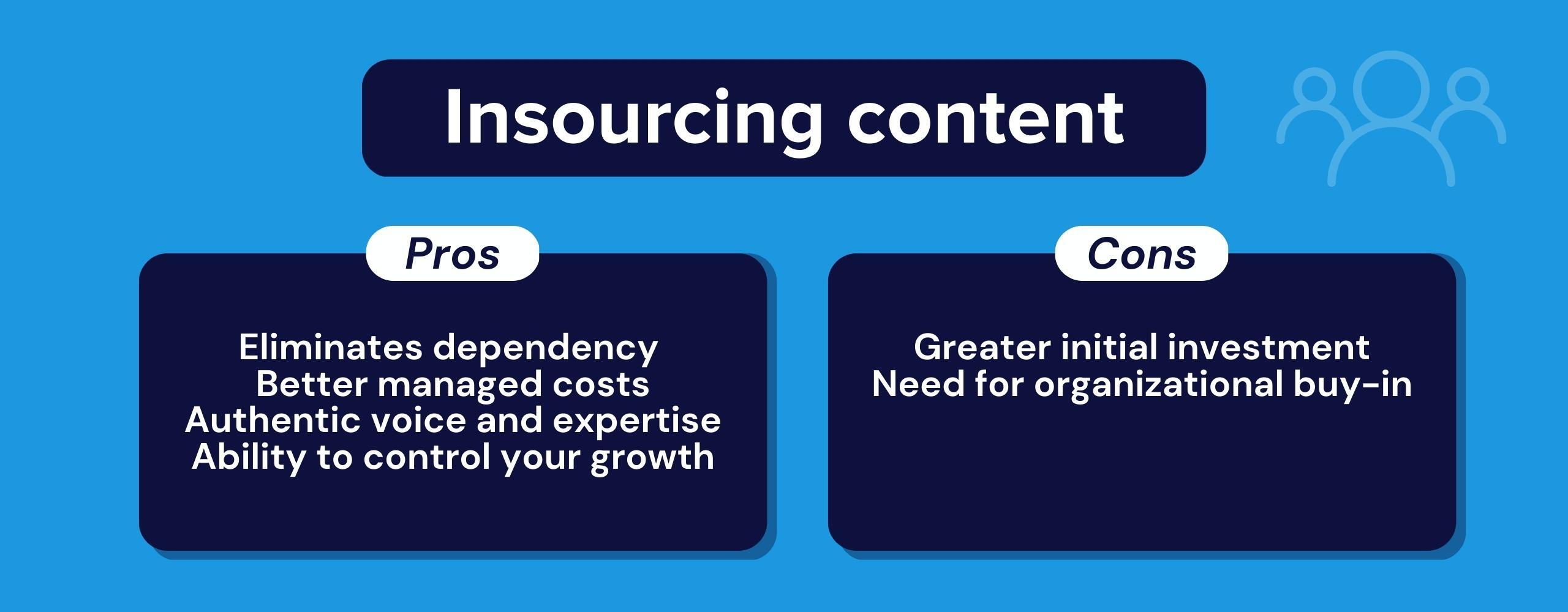Subscribe now and get the latest podcast releases delivered straight to your inbox.
In many cases, content is the primary driver of many important things at a business — organic traffic, leads, and, of course, revenue.
Establishing a content marketing program where you're publishing helpful, educational content to your website multiple times each week is essential, however, getting to the point is no easy task.
If you’ve been in the game for a while, you know there are two common ways to get there:
- You pay a third party to write content for your company. (That is, you outsource it)
- You create a culture of content within your organization and have members of your team write content. (Insourcing or creating your content in-house.)
Having helped hundreds of companies create content marketing programs of their own, we’ve interestingly enough discovered that the “who” element of your program is one of the biggest factors in the long-term success of any content marketing program.
However, it’s not as simple as just picking between option 1 or option 2.
Prior to making a decision as to how you’re going to build or change the way your company creates content, it’s important to consider the pros and cons of outsourcing content versus insourcing content and the long-term effects of each.
Note: Content creation can span many mediums and purposes but, in this article, we'll be focusing on written blog articles.
Outsourcing content vs. insourcing content

In our early days, IMPACT was very much a traditional inbound agency, creating content for our clients. Today, we are a digital sales and marketing training company helping clients learn how to create content and bring their inbound operations into their company.
That said, this article will be an extremely honest, transparent, and in-depth comparison based on over a decade of helping companies outsource and insource content.
You might see things in here that may make you say, “Hmm… never thought I’d hear a marketing company say that.” But you won’t find any “bashing” in here either.
Simply put, there are countless organizations that are finding success with outsourcing and/or insourcing.
The purpose here is to put it all on the table to empower you with everything you need to make the best decision for your organization.
Outsourcing content: Pros and cons

Companies that "outsource" their content production pay for and rely on a third party to create content on the company’s behalf.
These third parties are typically either an individually contracted or freelance writer, an online writing platform such as Scripted and Verblio that sources multiple writers, or a marketing agency that produces or outsources content on behalf of the client.
The pros and cons below take into consideration specific elements of all three outsourcing tactics listed above.
Pros of outsourcing content
Pro: Tons of options
When it comes to outsourcing content creation, there’s no shortage of options. You can find and hire niche contract writers via LinkedIn, subscribe to a writing platform where the writers come to you, or have an agency do all of that legwork for you.
The combination of these channels places thousands of available writers of multiple specializations, styles, and skill levels at your fingertips, ultimately giving you a better chance of finding the ideal writer(s) for your specific content.
Pro: Fast and easy start-up
One of the keys to any successful content marketing program is simply launching the content as fast as possible. The faster you can get the content onto your website and into the hands of your sales team, the sooner you’ll see the benefits of your efforts.
When you outsource, you can usually sign up with a writing platform today, submit your first content outline, and have your first piece of content written within a week. That’s pretty impressive!
Pro: Scalability
There’s a reason some enterprises leverage outsourced content creation: It works well at scale.
With thousands and thousands of writers available, it means that multiple pieces of content can be worked on simultaneously. Your resource is seemingly unlimited. (Keyword: seemingly — but that’s a topic for another article.)
Pro: Lower initial investment
When working directly with freelancers on a per-article basis or subscribing to an online writing platform, the initial costs are much cheaper in comparison to hiring an experienced, on-staff content manager.
Costs for articles in the 1,000-word range generally average around $300 per article (again, if you’re outsourcing it yourself). If you're looking for three articles per week, that's roughly $3,600 per month.
With the average salary of a content manager at $71,000 in the US (about $5,900 a month), this a significant savings.
Pro: All-inclusive plans
Over the years, online writing platforms have evolved into mini content marketing “agencies.”
The companies mentioned above (Scripted and Verblio) now offer all-inclusive plans that include SEO support, content strategy, and even one-to-one account management.
This type of engagement is also available through marketing agencies, but in most cases, you won’t find this level of strategy with a freelance writer.
Pro: Much improved writer rating and match systems
Early on, when writing platforms were just getting off the ground, it was very difficult to know who would be writing for you and the level of work they’d be able to deliver.
As the industry evolved, so too have these platforms. They now have matching technology to align the content you need with the writers who would be best suited to execute.
Cons of outsourcing content
Con: Cost variables

Despite it being a lower initial investment, outsourcing can become difficult to forecast exactly what you’re going to spend over time.
As your need for content increases, so too do your outsourced expenses.
You may start with outsourcing blog articles, but that can expand into newsletters, social posts, historical blog optimization, and landing pages.
Consider also that as Google continues to rewrite its algorithm, favoring longer, more in-depth content, you may find yourself forced to spend more for articles of a higher word count. Additionally, with some freelancers and writing platforms, you can be charged for additional revisions.
Finally, if you happen to be working with a marketing agency, you’re paying a healthy mark-up for them to outsource the work on your behalf.
Con: Higher risk of plagiarism
This is real. We’ve seen it happen — and the huge challenges that come along with it.
The good news is that many of the top writing platforms have integrated tools that scan the work of their writers for plagiarism. The increased risk, unfortunately, is more specific to individually contracted writers from LinkedIn, Upwork, or other unregulated sources.
Plus add in the rise of AI tools like ChatGPT, there's no saying how much original work you're getting.
You can, however, leverage free online plagiarism detection tools from companies like Grammarly to scan work you’ve received from hired contractors.
Con: Questionable technical value
Prospects and buyers are incredibly perceptive, especially when they’re getting ready to make a big purchase. They can recognize when something is “fluffy” or if it was written by a real expert.
This is especially true in very technical industries like healthcare, software, IT, and finance, among others.
For these types of buyers, the true value lies in the depth, breadth, accuracy, and specificity of the content they’re consuming.
They’re searching for companies that speak the same language with the same level of minutiae and detail.
They are looking for content from a source they can trust.
Yes, there are industry-specialized, third-party writers available, but truth is, they are unlikely to capture your true knowledge or voice.
Con: Lower flexibility
When you rely on a third-party to create your content, in most cases, you will be limited to the conditions of your contract. This means you're held to a certain number of articles and time spent on your company's needs, as your provider tries to balance multiple clients.
This makes it harder for you to pivot on your strategy or make changes quickly if need be.
Con: Writer reliability
In certain cases, the freelance writers found on LinkedIn or as part of online writing platforms are not exclusive to a single channel or even a single profession.
In other words, they may either have multiple deadlines to meet at once or they may have another full-time day job.
We've seen writers no-show to content planning meetings and blatantly miss final delivery deadlines.
Of course, similar risks exist in any form of content production, but it can be more prevalent with someone who’s not a part of your company and doesn’t have the same level of accountability.
Con: Dependency on the third party/ownership
This is perhaps the greatest drawback of leveraging third-party writers.
Instead of building the expertise and proficiencies of your internal team, you’re investing in the growth and development of people outside your organization. Even if you find someone you like, if the platform, agency, or writer is no longer available, you’re left high and dry.
Content is directly tied to the growth of your business, and the companies that own the growth of their organization reap the greatest return on investment (ROI).
Insourcing content: Pros and cons

Now that we’ve dug into outsourcing, let’s see how insourcing your content creation stacks up.
Companies that insource their content have all or specific members of their team contributing content on a regular basis. In other words, they've assembled the resources needed to successfully execute content creation on their team.
Companies that are most successful with content insourcing have:
- Executive leadership buy-in that content creation is not just a marketing initiative — it’s an organizational initiative and requires that sales, service, and marketing all contribute as the subject matter experts (SMEs).
- One person, usually called a content manager, completely dedicated to managing the content production process including interviews, creating the editorial calendar, writing content, and curating the team’s content.
- A content strategy built around educating their audience and being the most trusted teacher in their space
With the above in mind and thinking in the context of a truly successful insourced content marketing program, let’s dive into the pros and cons.
Pros of insourcing content
Pro: Eliminate third-party dependencies
By creating a system for content production within your organization, you’re effectively eliminating the risk of dependency on a third party.
When you bring operations in-house you have more control over potential changes in cost, tools, staff, etc. and the impact they have.
Should a member of your team that’s producing content within your organization leave, for example, you’ve already set up a system for finding, vetting, and onboarding a new one.
Or, if a tool you use dramatically raises its costs, you don't have to mindlessly abide. You have more flexibility to find an alternative.
Pro: Better managed costs
Yes. The initial investment in insourcing content is greater, considering that it requires hiring and on-boarding a full-time content marketing to own and manage it all. However, having this person at the helm of your content machine comes with many benefits.
Since they’ll have the ability to both produce content, as well as leverage other subject matter experts (SME) already on the team, the company won’t need to pay more to get more.
Should the number of articles per week need to be increased to drive more organic traffic and leads, you have someone on your team who you can work directly with to pivot and not feel chained by a contract.
Finally, with time being the only “increasing cost” associated with insourcing, it directly attributes to an exponentially greater ROI on each piece of content.
Pro: Authentic voice and expertise
While some outsourced writers are incredibly talented and may even have experience in your industry, they will never have the same brand, business, or operational-level understanding of your business. They also won't know its voice and culture. They’re not in it.
The people that will resonate most with your prospects and most accurately address your products, processes, and culture are the people in it everyday — your sales team, your engineering team, your customer support team, your executive team, and so on — your subject matter experts.
Notice I didn’t say your marketing team. Your marketing team may have the knowledge, but they’re not likely on the frontline like other members of your team.
Your SMEs are the ultimate source of the most honest, helpful, and transparent content available, anywhere.
Pro: Ability to control your growth
Let’s keep our business owner hat on for second…
As owners, we got into the game because we have a desire to build, shape, and control the things we create in the best interest of our customers, our employees… and let’s face it… ourselves.
Operationalizing the entire content production process from start to finish within your own organization grants you control that otherwise isn’t accessible from an outsourcing perspective.
Insourcing content is like the knobs of a guitar amplifier: You have the ability to turn up the volume when more is needed, to tweak the output when results need improving, and to leverage additional inputs when more voices are needed.
This is all without having to react to the freelance market or work within a confined, third-party platform in order to do so.
Cons of insourcing content
Con: Greater initial investment
Above, we discussed one of the pros of outsourcing content being the speed and relatively low cost at which you can find a freelance writer to help out.
Because insourcing content is a more holistic and longer-term play, it will cost more on the front end and take a bit more time to implement.
The primary cost (and time) driver is hiring and on-boarding the content manager. In the US, the average salary of a content marketing manager is $71,000 per year. This may go up or down depending on experience.
The investment in time includes outlining the job role within the company, posting the job online, and vetting the candidates.
Once the right candidate is selected, the two to four-week onboarding process begins. Towards the latter half of the process, they should be at a point where they can well-represent the company, and begin to curate their first articles.
Con: Need for organizational buy-in
This may not be a con per se, but it is an important prerequisite that may prove difficult.
Insourcing content requires that all parties from executives to marketing to sales are bought into and aligned on the vision of content as a main driver of growth within the organization.
This can certainly be a challenge.
The primary reason companies attempting to insource their content production struggle is because there’s a general lack of understanding of the following questions:
- What is content marketing?
- How is it done effectively?
- Why should each individual within the company be a part of it?
Achieving stellar results with content marketing requires that each person contributing to the future content efforts of the organization must have a shared understanding of the above.
Over the years, we’ve found that in order to overcome those barriers, a content marketing workshop (or inbound culture workshop) is the most critical first step.
So, insourcing or outsourcing content?
It’s a lot to take in, I know.
The good news is there are a few questions you can ask yourself to help narrow down your thoughts on what’s best for your organization:
- How important do you believe content is to the growth of your traffic, leads, and sales? Does your executive team feel the same?
- Is it worth the time and effort of aligning your entire organization around creating content?
- How are your current content marketing efforts going? Is growth stagnant or steady?
- Do you already have someone on your team who could own managing the content production process?
- Do you see content as a short-term or a long-term play?
- Have you failed with content marketing in the past?
- Are you already seeing a ton of success with online writing platforms or freelance writers? If you are, does it make sense to break it?
While these may still leave some ambiguity, they will certainly help you have the right discussions and determine what factors are more important in your decision between outsourcing and insourcing.
Wrapping it up
If you’re a regular reader of this blog, you may have noticed that we’re not shy about how passionate we are about insourcing content, and for good reason…
- 5 Battle-Tested Benefits of Insourcing Your Content Marketing
- In-House Content Creation: Is It Worth It?
- How to Interview and Hire the Right Content Marketing Manager for Your Company
- How to Give a Content Marketing Workshop that Gets Incredible Results
Over the years, we’ve helped hundreds of clients of all shapes and sizes produce content via both methods: insourcing and outsourcing content.
Hands-down, the clients that have achieved the greatest levels of success with content marketing all have one thing in common: They’ve fully adopted a culture of content within their organizations, but the fact is, it's not the answer for everyone.
Perhaps you just need a content marketing solution for a short period of time, or maybe you're a small organization that doesn't have the budget for a full-time hire yet. That's fine! Outsourcing will get you where you need to go too.
Use the information we shared above to help you determine the best solution for your organization. However, should you realize insourcing your content is the way to go, we're happy to help you get started.


Order Your Copy of Marcus Sheridan's New Book — Endless Customers!

